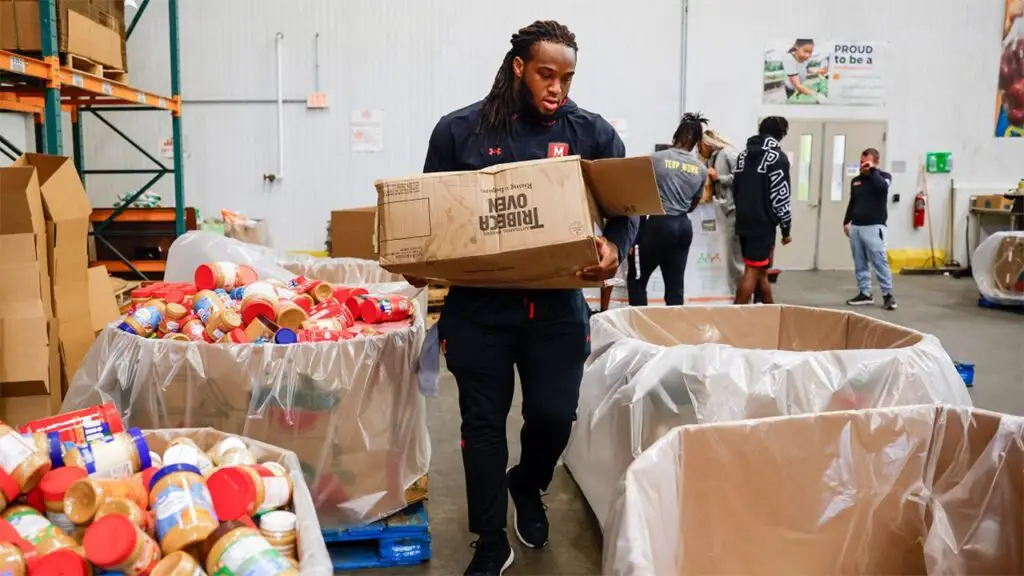
The NIL market is expected to be worth around $1.7 billion the 2024-2025 season according to Opendorse. Of that, $1.1 billion goes to college football. Men’s basketball players earned around $389 million. Female basketball players received around $75 million. Olympic athletes have generated around $134 million.
The money-making began back in July 2021 when the Supreme Court ruled that the NCAA could not prevent student-athletes from profiting off their name, image and likeness. Since the decision, legal battles between the NCAA and state legislatures have continued.
“It’s been really interesting to watch the competitive balance between states,” said Rob Sine, CEO of Blueprint Sports. “Tennessee is more aggressive, Florida wants to be more aggressive, and then Texas wants to be more aggressive. More state laws are passed and repealed and then passed again.”
Blueprint Sports oversees several high-profile collectives across the country. Sponsors, individual donors and companies often choose to fund collectives that then pay athletes for appearances or endorsements. It is estimated that the groups control about 80% of it the NIL market.
Broken gondola at Colorado ski resort, 174 rescued
“The schools are already so few and far between. As a professional services unit, they are happy to know that we have staff stationed on campus to represent them and the student-athletes,” Sine said. “As a marketing agency, we take care of all processes as a collective. We provide the third party for the athletic departments where we can negotiate with agents. We can have negotiations with athletes that we can handle if an athlete enters the transfer portal, contract termination or something similar.”
Blueprint Sports oversees collectives from across the country, including One Pack NIL in North Carolina, 5430 Alliance in Colorado, Pennsylvania’s Happy Valley United and Arkansas’ Arkansas Edge.
“Pennsylvania has different rules than Arkansas or North Carolina,” Sine said. “The NCAA guidelines are intended to be just what is, set guidelines. Then you have to comply with state laws in certain areas.”
The NCAA’s initial guidance in 2021 was consistent with the Supreme Court decision. Athletes could be paid if state law allows it. The rules sought to prevent schools from using zero funds to recruit athletes.
“It was a lot easier,” Sen. Tommy Tuberville, R-Ala. said, citing how NIL laws have changed the recruiting process in recent years. “Now there’s really no recruiting. It’s about buying. It’s completely different.”
Before being elected to the Senate, Tuberville coached at Ole Miss, Auburn, Texas Tech and Cincinnati. He has since joined Senator Joe Manchin IW.V. Co-sponsor of NIL legislation. He plans to work with a Democrat to reintroduce or amend the Athletes, Schools and Sports Protection Act (PASS Act) in the next Congress.
“In football and basketball, it’s whoever has the most money,” Tuberville said.
California signed the first state NIL law in 2019. Several others followed suit. Eventually, lawmakers began passing legislation to circumvent NCAA guidelines to allow NIL funds to be used for recruiting.
Strange laws in Colorado, including one against throwing snowballs
“Over the years the money has gotten more and more and the student-athletes go, wait a minute, you know, why don’t we get some of that money? “Why don’t we share in the revenue?” said Tuberville.
Tuberville says collectives have too much influence and laws like the PASS Act help level the playing field. But the collectives have a different opinion.
“I don’t think the federal government is the right path. I think it creates a lot more complications,” Sine said. “I’ve looked at these hearings before and there haven’t been a lot of groundbreaking results or good ideas coming out of them. There were many draft laws. I think it will be hard for them to say goodbye to anything.”
Not all university representatives believe that the federal government should stay out of the zero debate.
“This is a free market economy. We live in the greatest country.” in the world. And I think it’s great that our student-athletes are finally being compensated for what they’re worth. But we need national standards in college sports. Every coach needs to know that we all play by the same rules when the ball is dropped. And right now we’re not,” Auburn men’s basketball coach Bruce Pearl said.
The original laws in Alabama and South Carolina reflected NCAA policies that prevented the use of zero funds for recruiting. Other states began passing laws that deviated from this policy and provided loopholes for third-party donors to promise money to potential student-athletes. This caused the NCAA to change its stance. In 2022, the Division 1 Board of Directors clarified that schools can ask donors to provide funds for collectives as long as they are not designated for a specific sport or athlete.
“It was like that back then about graduation ratesor it was about: Can you help me get into the NBA? Will we win championships? What is the culture of the program? “Those things were more important to parents,” Pearl said. “Now it has become much more transactional.” What is my market value? How much will I get if I attend this school? And of course everyone is playing with a different budget at the moment. And that makes it a little unfair.”
The updated NCAA guidelines caused Alabama and South Carolina to repeal the original NIL laws. Both states noted that other schools had more opportunities to recruit better players.
“It gave us a little more freedom,” Pearl said sadly. “We want to see conferences and the people who run our programs empowered. At the moment everything is going to court. You will lose any lawsuit.”
Texas passed a law in 2023 that deviates from NCAA guidelines and allows donations to certain sports. The law also allows perks and benefits for fans who donate to NIL collectives. A clause also made it illegal for the NCAA to penalize a school for taking full advantage of NIL.
“Many people began to recognize a gray area. And so donors or other organizations across the country have thought about, “Okay, well, instead of raising $100,000, we’re going to raise $2 million.” “Or we’re going to raise $20 million and then really start building and creating “It gives us a big competitive advantage because no one tells us we can’t do it,” said Sine.
Praise goes out to the quick-thinking second-grader who saved a classmate’s life
New transfer portal rules have increased competition to find better players and pay out more money. A few months before the Supreme Court issued its NIL decision, the NCAA updated its transfer portal policy, giving Division I athletes a timely opportunity to immediately transfer and compete.
Originally, an athlete could transfer schools but had to sit out a year before playing unless the NCAA granted a waiver. In 2024, the association updated its policies to allow unlimited transfers as long as athletes met certain academic eligibility requirements.
“On the Marshall University football team, almost every one of them transferred. They had to cancel a bowl game,” Tuberville said. “Their coach left and they followed.”
Marshall was scheduled to play Army in the Radiance Technologies Independence Bowl. Instead, dozens of Marshall athletes entered the transfer portal. Army will now face Louisiana Tech instead.
“I understand that families are in a situation where they may never make more money than they make now. And that is what they are guided by. We teach children to run, not fight.”
UNLV quarterback Matthew Sluka announced in September that he would enter the transfer portal for the second time in his college career. Sluka’s agent said a $100,000 payment was never made after he agreed to transfer to UNLV.
“The graduation rates have been destroyed because of the combination of the NIL and the transfer portal working together and these guys are free agents,” Pearl says sadly. “In some cases the money can be significant.”
State laws also vary regarding who can represent student-athletes. In 2019, the Uniform Law Commission recommended that states adopt the Uniform Athletes Agents Act. It allowed student-athletes to hire agents to protect them from unfair practices. At least 39 states have passed the law, but it makes no mention of NIL. Some legislatures have added agent clauses to state laws.
“Players have agents, they have lawyers, they have accountants. We fought against this for many, many years. Do not sign with agents. Keep them out of your life. But college football and college sports have grown.”
CLICK HERE TO GET THE FOX NEWS APP
The NCAA will do it now allow universities to pay players directly, in addition to what they already receive through scholarships and third-party payments. Each school has a cap of up to $20.5 million for all sports. Schools are already funneling most of that into football programs.
“We’re going to lose a lot of football programs, basketball programs and women’s sports if we don’t find a solution. The NCAA needs to work with us,” Tuberville said. “There really aren’t many answers when you have so many hands in the game and everyone wants it their way.”





